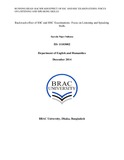| dc.contributor.advisor | Akhter, Mahmuda | |
| dc.contributor.author | Sultana, Sayeda Niger | |
| dc.date.accessioned | 2015-01-31T06:48:07Z | |
| dc.date.available | 2015-01-31T06:48:07Z | |
| dc.date.copyright | 2014 | |
| dc.date.issued | 2014-12 | |
| dc.identifier.other | ID 11103002 | |
| dc.identifier.uri | http://hdl.handle.net/10361/3963 | |
| dc.description | This thesis is submitted in a partial fulfillment of the requirements for the degree of Bachelor of Arts in English, 2014. | en_US |
| dc.description | Cataloged from PDF version of thesis. | |
| dc.description | Includes bibliographical references (page 39-40). | |
| dc.description.abstract | Exam is one of the major influential factors on learning outcome. It encourages students to practice more on specific skills, topics or subject of assigned curricula of an exam. According to Skinner (1957) language learning is similar to learning a behavior where learner needs to have a proper stimuli and operant conditioning. Here, for students exam work as one of the most prominent stimuli (driving force to reinforce) to work harder (Heaton, 1976). When achievement tests like SSC and HSC exam exclude speaking and listening skills it encourages students as well to not to practice or overlook those skills from learning. However, researcher selected two target groups of people to collect data; those are college teachers and intermediate level students. To collect data from teachers on this issue, researcher used a set of questionnaire along with face to face interview. On the other hand, researcher only used survey questionnaire for students to collect data from them. From the findings, it is found that, both groups of participants pointed that faulty exam is the reason for students lack of practice and consequently poor proficiency level in speaking and listening. They believed that if there were exams on those skills, students would have practiced more those skills. Moreover they mentioned education ministry and educational institutes’ involvement can resolve the problem. However, from the findings analysis it can be recommend that education ministry should include speaking and listening in all public exams and make it mandatory for all schools and colleges to include those skills in their institutional exams. On the other hand teachers can make mandatory use of English language in class as well as outside the classes. Moreover, institute can arrange classes for those skills. Lastly, involvement from parents, relatives and friends in encouraging students to practice those skills can bring the change very swiftly. | en_US |
| dc.description.statementofresponsibility | Sultana, Sayeda Niger | |
| dc.format.extent | 65 pages | |
| dc.language.iso | en | en_US |
| dc.publisher | BRAC University | en_US |
| dc.rights | BRAC University thesis reports are protected by copyright. They may be viewed from this source for any purpose, but reproduction or distribution in any format is prohibited without written permission. | |
| dc.subject | English and humanities | en_US |
| dc.title | Backwash effect of SSC and HSC Examinations : focus on listening and speaking skills | en_US |
| dc.type | Thesis | en_US |
| dc.contributor.department | Department of English and Humanities, BRAC University | |
| dc.description.degree | B.A. in English | |

